#sap inventory solutions
Explore tagged Tumblr posts
Text
Never Out of Stock: Solving Fashion Retail Inventory Challenges with SAP Technology

In today’s competitive fashion industry, managing inventory efficiently is no longer just a back-end operation—it’s a customer experience imperative. Whether it’s ensuring the latest trends are available in stores or maintaining a seamless flow of products across digital channels, fashion retailers must align their supply chains with real-time consumer demands. This is where Retail Supply Chain Solutions become essential, especially when powered by SAP technology.
At McKinsol, we specialize in integrating advanced SAP systems into retail operations, helping businesses overcome inventory challenges, minimize stockouts, and improve customer satisfaction. This blog explores how SAP-driven Retail Supply Chain Solutions can transform fashion inventory management to ensure you’re never out of stock.
The Unique Challenges in Fashion Retail Inventory
Unlike other industries, fashion retail faces a unique set of inventory challenges:
Short product life cycles due to trends and seasons
High SKU variation (size, color, style)
Omnichannel retailing pressure (stores, online, mobile)
Volatile demand forecasts
Fast turnover requirements
These challenges lead to two critical risks: overstocking and stockouts. Overstocking ties up capital and increases markdowns, while stockouts result in missed sales opportunities and dissatisfied customers. Addressing these pain points requires smart, integrated, and agile Retail Supply Chain Solutions.
The Power of SAP in Retail Supply Chain Optimization
SAP’s suite of retail solutions provides a robust digital backbone for managing complex supply chain operations. From demand planning to inventory optimization, SAP enables fashion retailers to gain real-time visibility, automate processes, and make data-driven decisions.
McKinsol leverages the following SAP platforms to deliver comprehensive Retail Supply Chain Solutions:
SAP S/4HANA
SAP Integrated Business Planning (IBP)
SAP Fashion Management Solution (FMS)
SAP Business Technology Platform (BTP)
iDMX – Intelligent Data Management Xpress by McKinsol
Let’s dive deeper into how these tools contribute to solving inventory challenges in fashion retail.
1. Real-Time Inventory Visibility with SAP S/4HANA
SAP S/4HANA serves as the central nervous system of retail operations. It provides a unified view of inventory across all channels—warehouses, distribution centers, and stores. This ensures retailers have a clear picture of stock levels in real-time, reducing the chances of missed opportunities or overstock.
Benefits:
Real-time inventory tracking
Automated stock transfers
Instant alerts for low inventory
Integration with suppliers and fulfillment centers
With this kind of visibility, businesses can make quicker, smarter decisions and improve operational efficiency.
2. Demand Forecasting with SAP IBP
Fashion trends are unpredictable, making accurate forecasting difficult. SAP IBP uses machine learning, historical sales data, and external market trends to deliver precise demand forecasts.
Key features of SAP IBP:
Demand sensing and planning
Inventory balancing across locations
What-if analysis for supply chain scenarios
Real-time collaboration among departments
Effective forecasting helps fashion retailers reduce excess inventory, avoid stockouts, and align inventory with consumer demand.
3. End-to-End Integration with SAP Fashion Management Solution (FMS)
SAP FMS is specifically designed for the fashion industry. It integrates wholesale, retail, and manufacturing into one streamlined system—an essential part of a strong Retail Supply Chain Solution.
SAP FMS delivers:
Centralized control over diverse product lines
Unified master data for products, prices, and promotions
Real-time inventory sharing across channels
Rapid product rollouts and markdown optimization
By bringing all aspects of fashion operations onto a single platform, retailers can increase their responsiveness and accuracy.
4. Data Quality and Governance with iDMX
Successful supply chain management relies heavily on clean, consistent data. McKinsol’s proprietary tool, iDMX (Intelligent Data Management Xpress), ensures that all master data—products, vendors, and locations—is accurate, validated, and synchronized across systems.
iDMX capabilities include:
Master data consolidation
Automated data validation and approval workflows
Enhanced data governance
Reduced implementation timelines for SAP
Clean data results in better inventory decisions, fewer system errors, and a more reliable Retail Supply Chain Solution overall.
5. Intelligent Insights with SAP BTP
SAP Business Technology Platform (BTP) enables real-time analytics and automation through advanced technologies like AI, machine learning, and IoT. This empowers retailers with actionable insights to fine-tune inventory strategies.
SAP BTP enables:
Predictive analytics for inventory performance
Custom dashboards and KPIs
Scenario modeling for supply chain events
Proactive identification of supply disruptions
These insights help businesses stay agile, even in uncertain environments.
Business Benefits of SAP Retail Supply Chain Solutions
Adopting SAP-powered Retail Supply Chain Solutions transforms inventory management from a challenge to a competitive advantage. Fashion retailers experience:
Increased Efficiency:
Automated stock replenishment
Reduced manual errors
Faster response to demand changes
Improved Customer Satisfaction:
Better product availability
Shorter delivery timelines
Unified brand experience across channels
Financial Impact:
Lower carrying costs
Fewer markdowns and returns
Higher inventory turnover and ROI
By investing in smart supply chain technology, fashion retailers position themselves for sustainable growth.
The McKinsol Advantage
McKinsol Consulting is not just a technology provider—we are strategic partners committed to your success. With over a decade of experience in SAP implementation and retail consulting, we deliver tailored Retail Supply Chain Solutions that align with your unique business needs.
Why Choose McKinsol:
Expertise in fashion retail and SAP technology
Proven SAP FMS and S/4HANA implementations
Proprietary iDMX data governance platform
Personalized support and training
End-to-end consulting from strategy to execution
We don’t just help you manage inventory—we help you build an intelligent, resilient supply chain.
Conclusion
In the dynamic world of fashion retail, being "never out of stock" is more than an inventory goal—it’s a brand promise. With McKinsol’s SAP-powered Retail Supply Chain Solutions, fashion businesses can streamline operations, reduce risks, and delight customers at every touchpoint.
From real-time visibility to intelligent forecasting, our solutions address the root causes of inventory issues and enable your business to thrive in the digital age. Let McKinsol guide your transformation and ensure that your shelves are stocked—not just today, but always.
Ready to take control of your fashion inventory? Contact McKinsol Consulting Inc. to learn how SAP-driven Retail Supply Chain Solutions can future-proof your fashion business.
0 notes
Text
0 notes
Text
Valtitude S & OP
Sales and Operations Planning Process thrives on collaboration and honest communication between key organizational players. This is a unique process embodying several information sharing sessions and decision forums. The final intent here is to generate an organizational plan and key Sales and Operations issues for the top organizational manager to decide on.
We kick off the S&OP implementation with an on-site workshop to be attended by your sponsors and stakeholders. For many companies on the wall about taking the plunge, this workshop will be a key input and bring to fore many company-specific drivers. Our on-site workshop addresses the following key steps in developing and implementing an effective S&OP process.
By having your key stakeholders attend this workshop, you attain a huge competitive advantage in moving forward the idea of integrated business planning.
To know More, Visit Us:
#Demand planning#Forecasting consulting#Value chain planning#Supply chain management#Forecasting#SCM#Valtitude#Demand Planning#S&OP Forecasting Consulting#Supply Chain Management Software#IBP#Supply Chain Optimization#SAP SCM#APO modeling#forecasting tool#SAP#Usability#Analytics#IBP Demand#IBP Inventory#IBP Supply#ForecastPro#Forecasting Tool#Demand Modeling#APS#SAP SCM APO#Solutions Tuning#Re-implementation#SAP IBP#integrated business planning
0 notes
Text
The Power of SAP Digital Supply Chain Management in Transforming Supply Chain Operations
In the fast-paced business environment of today, organizations face a variety of challenges when trying to manage their supply chains efficiently. Innovative software called SAP Digital Supply Chain Management (DSCM) makes use of recent technological and digital advancements to increase the efficiency of supply networks. In this post, we’ll examine the SAP DSCM concept, its key elements, and how…
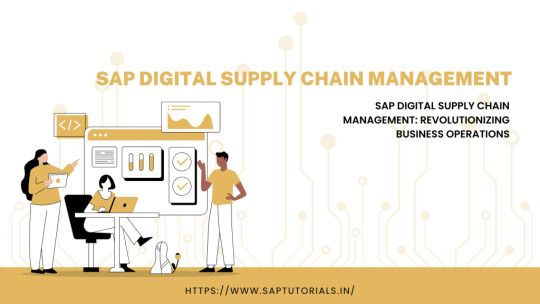
View On WordPress
#DSCM#sap for supply chain#sap software for supply chain management#sap supply chain management modules#sap supply chain solutions#SCM#supply chain inventory management software#supply chain sap#what is sap supply chain
1 note
·
View note
Text
Why Infor SyteLine ERP Is Ideal for Mid-Market Manufacturers & Service Providers

When electronics and other mid-market manufacturers want their ERP system to enable growth and create a new competitive advantage, they rely upon Infor Infor SyteLine, also known as CloudSuite Industrial (CSI).
When service and rental equipment providers want their ERP system to enable their growth into world-class service organizations and empower field technicians with data at their fingertips, they also rely upon Infor Infor SyteLine CSI.
We’ve all heard the horror stories of failed ERP implementations so, when manufacturers and service providers want SyteLine ERP successfully implemented—and guaranteed—they rely upon Bridging Business Technology Solutions (BBTS).
An ERP Ideal for Manufacturers
Infor SyteLine is the primary ERP we support because it’s ideal for use by discrete and process manufacturers, especially electronics manufacturers. We also guarantee the success of your Infor SyteLine implementation whether you’re commissioning an ERP system for the first time or replacing your current system, so you can cross the risk of a failed implementation off your list of worries.
SyteLine also can be customized to recognize customer-owned inventory and allocate it only to that customer so you don’t have a unique part number for the same part used by multiple customers. You can also reserve stock for specific products of the same customer or reserve any part in your inventory for a specific order until the order is released.
SyteLine delivers the same type of functionality as SAP and Oracle for a fraction of the cost and headache of implementing a tier 1 ERP system.
An ERP Ideal for Service Providers
Infor SyteLine is the primary ERP we support because it’s a perfect fit for service providers, especially those who rent equipment. We also guarantee the success of your Infor SyteLine implementation. So, whether you’re commissioning an ERP system for the first time or replacing your current system, you don’t have to worry about the disruption of a failed implementation.
Among the biggest benefits of SyteLine for service providers is no longer having to enter data multiple times into disparate systems. Working with common data means that everyone works from the same real-time information, which:
Empowers your service technicians to complete more service orders
Enables your employees to spend more time building relationships with customers
Gives your managers the tools to analyze data and find strategic growth opportunities
SyteLine delivers the same type of functionality as SAP and Oracle for a fraction of the cost and none of the headaches associated with implementing a tier 1 ERP system.
Successful Implementations, Guaranteed
The BBTS team has implemented SyteLine successfully over 165 times since 2013 with a proven ERP implementation process that begins with improving inventory control, planning and forecasting, financial close, and other business processes. SyteLine then standardizes these process best practices and ensures they are followed.
BBTS also provides post-implementation SyteLine enhancements, upgrades, business process improvements, and workflow optimization so you get the most out of your SyteLine investment.
Get Started Today
To determine if SyteLine ERP is right for you, we will connect you with one of our implementation experts as part of a process review. A successful implementation begins with understanding your core business processes, then recreating and evolving them in SyteLine.
Together, we can determine how you will benefit from SyteLine and calculate a target return on investment (ROI) to help justify the move. Contact us to learn more about SyteLine and how we are able to guarantee a successful ERP implementation when so many fail. You can also take advantage of the process review offer.
#erp software#infor#syteline#cloudsuite industrial (CSI)#manufacturing#service providers#customer owned inventory
8 notes
·
View notes
Text
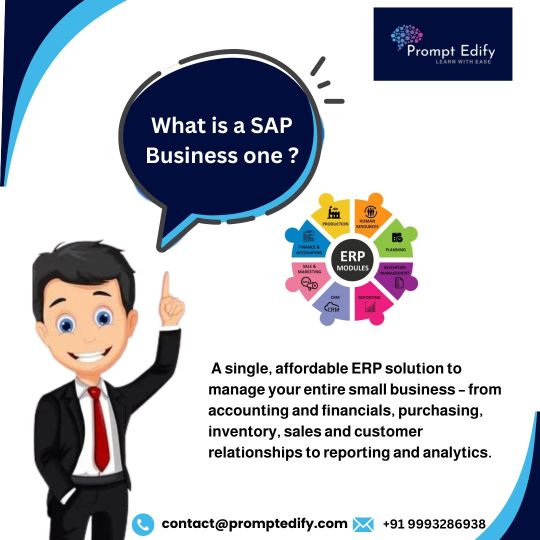
Overview:
SAP Business One (SAP B1) implemented at Prompt Edify, Rwanda, serves as an integrated enterprise resource planning (ERP) solution tailored for small and medium-sized enterprises (SMEs).
Streamlined Operations:
Facilitates seamless management of core business functions including accounting, sales, purchasing, inventory, and production, enhancing operational efficiency.
Localized Adaptation:
Customized to meet specific business requirements and comply with Rwandan regulatory standards, ensuring legal and financial compliance.
Enhanced Financial Management:
Enables accurate financial reporting, budgeting, and forecasting, empowering Prompt Edify with insightful decision-making capabilities.
Inventory Optimization:
Provides real-time visibility into inventory levels, facilitating better inventory control, reducing stockouts, and optimizing procurement processes.
Streamlined Sales Process:
Automates sales processes from lead generation to order fulfillment, improving customer satisfaction and sales performance.
Improved Customer Relationship Management (CRM):
Centralizes customer data, enabling Prompt Edify to deliver personalized experiences, strengthen customer relationships, and drive loyalty.
Data-driven Insights:
Generates comprehensive reports and analytics, empowering Prompt Edify with actionable insights to identify trends, opportunities, and challenges.
Scalability and Growth:
Supports business expansion by offering scalability, flexibility, and easy integration with other systems as Prompt Edify grows and diversifies its operations.
User-friendly Interface:
Intuitive interface and user-friendly features enhance employee productivity, reducing training time and ensuring rapid adoption across the organization.
Tech Support and Maintenance:
Access to ongoing technical support and maintenance services ensures smooth operation and timely resolution of any issues, minimizing downtime.
Long-term Value:
Investment in SAP Business One offers Prompt Edify long-term value through increased operational efficiency, cost savings, and sustained growth in the dynamic Rwandan market.
Implementing SAP Business One at Prompt Edify underscores a strategic commitment to leveraging advanced technology to drive innovation, efficiency, and competitiveness in Rwanda's business landscape.
📱 (+91) 99932 86938 📧 [email protected] 🌐 www.promptedify.com 🔗 You can chat with us on WhatsApp 📑 Book you spot now👉 Register Now
#sap certification#sapconsultant#sap consulting services#sap online training#sap fico course#sap modules#sap_certification#career in sap#sap business one
2 notes
·
View notes
Text
Exploring the Significance of ERP Software: How It Works, Why It's Vital for Companies, and the Benefits for Your Business
Enterprise Resource Planning (ERP) software stands as the backbone of modern businesses, planning a masterpiece of operations seamlessly. This comprehensive suite of integrated applications manages core business processes, including finance, HR, inventory, supply chain, and more. Its significance lies in its ability to streamline operations, enhance efficiency, and foster data-driven decision-making.
Cloud-based ERP solutions offer a versatile edge over traditional on-premises systems. They facilitate real-time data accessibility, scalability, and cost-effectiveness. Conversely, on-premises ERP software provides robust security and customization options, ideal for businesses with specific compliance needs or intricate operational structures.
Adopting the best ERP Software Consulting Solutions is a strategic move for companies, as it centralizes disparate processes into a unified platform, eradicates data silos, and enhances collaboration, thereby boosting productivity and offering a comprehensive view of the business for smarter, data-backed decisions."
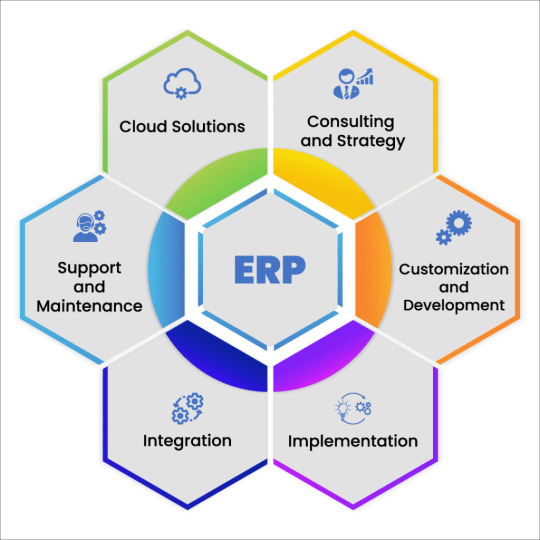
The benefits of ERP software for your business are multifaceted. It optimizes resource utilization, streamlines workflows, minimizes errors, and accelerates reporting cycles. This ultimately results in improved customer satisfaction, reduced operational costs, and better agility in responding to market changes.
When seeking the best ERP software development services, solutions, implementation, or consulting, businesses must prioritize expertise, reliability, and compatibility. The best ERP software development services and solutions cater to unique business needs, offering tailor-made solutions for seamless integration and functionality.
Choosing the best ERP software implementation services or solutions involves a thorough evaluation of the provider's track record, customer reviews, and adaptability to your company's requirements. Expert ERP software consulting services navigate businesses through the maze of choices, ensuring optimal software selection, implementation, and long-term success.
In conclusion, the strategic implementation of ERP software can revolutionize business operations, driving efficiency, innovation, and competitiveness. Selecting the best ERP software development, implementation, and consulting services is pivotal for maximizing the benefits and leveraging the full potential of this transformative technology.
ERP Offerings & Practice's
SAP/S4 HANA ERP Software Solutions
Ellucian Banner ERP Software Solutions
Peoplesoft ERP Software services
Oracle Cloud ERP Software services
UKG ERP Software services
Salesforce ERP Software services
3 notes
·
View notes
Text
Is SAP Accounting Software or ERP?
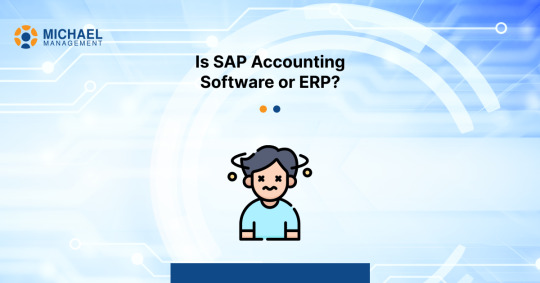
SAP is not just accounting software but a comprehensive Enterprise Resource Planning (ERP) solution. While SAP does include accounting functionalities, it goes beyond that by integrating various business processes such as sales, production, inventory, and human resources. SAP's ERP software allows organizations to improve efficiency and gain valuable insights into their business performance.
For more details, visit: https://www.michaelmanagement.com/browse/sap-erp/financials/accounts-receivable-payable
2 notes
·
View notes
Text
The Crucial ERP System Examples: Transforming Business Operations

In today’s fiercely competitive business realm, the quest for operational efficiency and streamlined management is paramount. Enterprise Resource Planning (ERP) systems stand tall as technological marvels, revolutionizing the way businesses operate. These robust software solutions amalgamate various functions within a unified framework, enabling seamless coordination across departments and facilitating data-driven decision-making.
This exploration ventures into the realm of ERP systems, shedding light on a spectrum of exemplary solutions that have reshaped modern business operations. From stalwarts like SAP ERP and Oracle ERP Cloud to innovative players like Microsoft Dynamics 365 and Odoo, each system represents a unique amalgamation of features, functionalities, and industry applications.
This comprehensive journey traverses the functionalities, industry adaptability, and transformative potentials of these ERP systems. Understanding their intricacies is pivotal for businesses seeking to optimize processes, unlock efficiencies, and navigate the complexities of today’s business landscape. Join this insightful exploration to unravel the significance and impact of these ERP system examples in shaping the future of business operations.
ERP System Examples
1. SAP ERP: Revolutionizing Business Management
SAP ERP has solidified its position as a leader by providing an all-encompassing suite covering critical business functions. Beyond its core modules in finance, HR, and supply chain, SAP offers specialized applications for industry-specific needs. For instance, SAP S/4HANA, an intelligent ERP, integrates AI and analytics for real-time insights, empowering businesses to adapt swiftly to market changes.
The scalability of SAP ERP is noteworthy, catering to startups aiming for growth and global corporations managing complex operations. It provides modular solutions, enabling businesses to adopt specific functionalities based on their immediate needs.
2. Oracle ERP Cloud: Innovating Operations in the Cloud
Oracle ERP Cloud’s robust suite extends far beyond traditional ERP capabilities. It embraces emerging technologies like AI, machine learning, and blockchain to drive innovation. Its predictive analytics empower businesses to anticipate market trends, optimize supply chains, and mitigate risks effectively.
The cloud-based structure of Oracle ERP Cloud ensures not just accessibility but also scalability without compromising security. It enables seamless integration with other Oracle Cloud applications, fostering a unified ecosystem for comprehensive business management.
3. Microsoft Dynamics 365: Integrating CRM and ERP Capabilities

Microsoft Dynamics 365 is a fusion of CRM and ERP functionalities, providing a holistic platform for businesses. Unlike its core ERP modules, Dynamics 365 offers advanced tools for customer engagement, field service, and marketing automation. Its flexibility lies in its modularity, allowing businesses to tailor their systems by choosing specific applications that align with their objectives.
Moreover, its integration with Microsoft Office 365 and Power Platform strengthens collaboration and data analysis, facilitating informed decision-making across departments.
4. NetSuite: Empowering Diverse Industries
NetSuite’s cloud-based ERP system addresses the complex needs of various industries. Its suite encompasses solutions for financial management, e-commerce, and inventory control. Beyond the core ERP functionalities, NetSuite offers industry-specific modules, such as SuiteCommerce for retail businesses and SuiteSuccess for services, enhancing its appeal across diverse sectors.
The scalability and adaptability of NetSuite make it a preferred choice for businesses experiencing rapid growth or seeking to expand into new markets.
5. Infor ERP: Tailored Solutions for Specific Sectors
Infor’s industry-specific ERP solutions cater to the nuanced requirements of sectors like healthcare, manufacturing, and distribution. In addition to its standard ERP functionalities, Infor focuses on specialized applications such as Infor CloudSuite Healthcare for healthcare organizations and Infor LN for manufacturing, ensuring tailored solutions for sector-specific challenges.
Infor’s commitment to innovation and addressing sector-specific complexities underscores its relevance in the ERP landscape.
6. Epicor ERP: Amplifying Industry Operations

Epicor ERP excels in catering to industries such as manufacturing, distribution, retail, and services. Its core ERP functionalities are complemented by advanced analytics and business intelligence tools. Epicor’s Smart Inventory Planning and Optimization (IPO) tool, for instance, utilizes AI to enhance inventory management, improving efficiency and reducing costs.
Moreover, its agile architecture enables easy customization and integration with third-party applications, providing businesses with a highly adaptable solution.
7. Odoo: Flexibility and Customization
Odoo’s open-source ERP system offers an extensive suite of applications covering CRM, inventory management, project management, and more. What sets Odoo apart is its modular nature, allowing businesses to select and integrate specific applications as per their requirements. Odoo’s flexibility and affordability are especially beneficial for small to medium-sized enterprises seeking customizable solutions without exorbitant costs.
The Value of ERP Systems in Modern Business
ERP systems serve as catalysts for efficiency, productivity, and growth:
Streamlined Operations: Automating tasks streamlines processes, reducing manual errors and optimizing resource allocation.
Enhanced Data Management: Centralized databases ensure data consistency and accuracy, fostering informed decision-making.
Agile Decision-Making: Real-time data access empowers businesses to make agile decisions, staying ahead in dynamic markets.
Customer-Centric Approach: Integrated CRM functionalities enable businesses to deliver personalized services, boosting customer satisfaction and loyalty.
Making Informed Choices: Selecting the Right ERP System

The process of choosing an ERP system involves careful evaluation and alignment with a business’s unique needs. Understanding the scalability, integration capabilities, and industry-specific functionalities of each system is crucial for successful adoption.
Conclusion: Embracing ERP Systems for Sustainable Growth
The landscape of ERP systems continues to evolve, offering businesses versatile solutions to streamline operations, enhance efficiency, and foster sustainable growth. From SAP’s scalability to Oracle’s cloud-driven innovation and Odoo’s customization prowess, each system exemplifies the diverse capabilities shaping modern business management.
Selecting the right ERP system aligned with specific needs remains pivotal for organizations seeking resilience and competitiveness. As businesses strive for optimization and adaptability, embracing these transformative technologies ensures a strategic advantage in an ever-evolving market. It stands as a pillar of efficiency, empowering businesses to navigate complexities and drive success through informed decisions and streamlined operations.
Also Read: A Deep Dive into Corporate Wellness Programs for a Healthier, Happier Workplace
#ERPRevolution#BusinessTransformation#TechInnovation#DigitalTransformation#EnterpriseSolutions#InnovationInBusiness#TechLeadership
2 notes
·
View notes
Text
Enhancing Manufacturing Excellence: 6 Key Benefits of SAP Business One
Staying ahead of the competition requires more than just producing high-quality products. It demands efficient operations, streamlined supply chains, and real-time decision-making capabilities. This is where SAP Business One, a robust Enterprise Resource Planning (ERP) solution, steps in to transform the manufacturing sector. In this blog, we will explore six significant benefits that SAP Business One brings to manufacturers of all sizes, from small businesses to mid-sized enterprises.

Better Visibility
One of the primary challenges in manufacturing is maintaining visibility into the complex web of supply chains, operations, and inventory resources. SAP manufacturing software addresses this challenge by providing enhanced visibility through seamless integration with shipping logistics and supply chains. This integration empowers manufacturers with real-time data, enabling them to make well-informed decisions promptly.
Furthermore, the platform offers customized and interactive dashboards that offer a 360-degree view of the entire manufacturing process. This flexibility in analysis and insights allows manufacturers to adapt swiftly to changing customer demands and meet stringent deadlines.
Improved Productivity
SAP manufacturing software incorporates Material Requirements Planning (MRP) functionality, which replaces outdated production scheduling methods with a structured, multilevel production process. MRP also facilitates resource planning for machine maintenance, leading to overall productivity improvements.
Additionally, the MRP wizard streamlines material procurement and production planning, significantly reducing pre-production lead times. This efficiency boost directly contributes to enhanced productivity and better resource utilization.
Cost Control
Cost control is a paramount concern for manufacturing companies. SAP manufacturing software offers a solution by optimizing daily operations, reducing waste, and simplifying processes. Informed decision-making, enabled by SAP manufacturing software, aids in identifying cost-saving opportunities and increasing overall business profitability.
Working Capital Management
Managing working capital is essential for the day-to-day operations of manufacturing companies. SAP manufacturing software offers a comprehensive suite of modules and capabilities that help in managing working capital effectively. This includes overseeing accounts receivables, accounts payables, cash flow, liquidity, and inventory planning.
Customized purchasing reports provide real-time insights into working capital challenges, replacing the traditional year-end or month-end reports. This level of control from SAP services allows manufacturers to make proactive decisions, ensuring the stability of their operations.
Inventory Management
Effective inventory management is critical for manufacturing success. SAP Business One equips manufacturers with advanced warehouse tracking features and real-time stock reports. These features help document stock levels and monitor stock transfers between warehouses, ensuring a lean inventory management approach.
The ERP solution strikes an ideal balance between inventory stock and production capacities, facilitating on-time product deliveries, efficient inventory cost management, and meeting customer demands effectively.
Regulatory Compliance
Manufacturers must adhere to industry regulations at every stage of the manufacturing process, from procurement to final product delivery. SAP Business One plays a crucial role in improving regulatory compliance by integrating these standards into its operations seamlessly.
Furthermore, the platform empowers manufacturers to embed quality control into their manufacturing processes, providing insights into vendor performance and enhancing customer satisfaction.
Conclusion
SAP system emerges as a powerful ally, offering a wide array of benefits to manufacturers. From improved visibility and productivity to cost control, working capital management, inventory optimization, and regulatory compliance, this ERP solution empowers manufacturing companies to thrive in a competitive environment. By embracing SAP Business One, manufacturers can embark on a journey toward excellence, ensuring they meet customer demands efficiently and maintain a strong position in the market.
2 notes
·
View notes
Text
Understanding the Power of SAP Robotic Automation
1. Introduction
In a world where data and processes drive businesses, sap robotic automation is a technology that stands out. It promises to transform the way enterprises operate by automating repetitive tasks, enabling employees to focus on more strategic activities.
2. What is SAP Robotic Automation?
SAP Robotic Automation, often referred to as RPA (Robotic Process Automation), is a technology that uses software robots or "bots" to automate routine and rule-based tasks within an organization. These bots mimic human actions, interact with various systems and applications, and can work around the clock without rest.
3. How Does SAP Robotic Automation Work?
SAP Robotic Automation works by employing bots to execute predefined tasks. These bots are trained to follow specific workflows, interact with user interfaces, extract and input data, and make decisions based on predefined rules. They can seamlessly integrate with existing software systems, making them highly versatile.
4. Benefits of SAP Robotic Automation
Streamlined Processes
One of the primary advantages of SAP Robotic Automation is the streamlining of processes. It allows organizations to automate repetitive tasks, reducing the time and effort required to complete them.
Reduced Errors
Humans are prone to errors, but bots are not. By automating tasks, SAP Robotic Automation significantly reduces the chances of human error, leading to higher accuracy in operations.
Enhanced Productivity
With routine tasks automated, employees can focus on more strategic and creative aspects of their roles, ultimately leading to increased productivity and job satisfaction.
5. Applications of SAP Robotic Automation
Finance and Accounting
In the finance sector, SAP Robotic Automation can automate tasks such as data entry, invoice processing, and reconciliation, allowing financial professionals to concentrate on financial analysis and strategy.
Human Resources
Automating HR tasks like employee onboarding, payroll processing, and attendance tracking frees HR teams to focus on employee engagement and talent development.
Supply Chain Management
SAP Robotic Automation can optimize supply chain processes by automating inventory management, order processing, and demand forecasting.
6. Implementing SAP Robotic Automation
Selecting the Right Processes
Not all processes are suitable for automation. Organizations should carefully choose which tasks to automate based on criteria like frequency, rule-based nature, and potential ROI.
Integration with Existing Systems
Smooth integration with existing software and systems is crucial for the success of SAP Robotic Automation projects.
Training and Development
Employees need to be trained to work alongside bots and understand how to manage and maintain automated processes.
7. Challenges and Solutions
Data Security Concerns
As bots interact with sensitive data, ensuring data security is a top priority. Implementing encryption and access controls can mitigate these concerns.
Change Management
Introducing automation can lead to resistance among employees. Effective change management strategies are essential to ensure a smooth transition.
Maintenance and Support
Regular maintenance and timely support are necessary to keep the automation ecosystem running smoothly.
8. Future Trends in SAP Robotic Automation
The future of SAP Robotic Automation holds exciting possibilities, including enhanced AI capabilities, greater integration with IoT devices, and advanced analytics for smarter decision-making.
9. Real-Life Success Stories
Explore how leading organizations have harnessed the power of SAP Robotic Automation to achieve remarkable results.
SAP Robotic Automation is a game-changer for businesses looking to boost efficiency, reduce errors, and empower their workforce. By harnessing the power of automation, organizations can stay competitive in today's rapidly evolving business landscape.
Read More : https://www.beezlabs.com/tulip
2 notes
·
View notes
Text
0 notes
Text
VALTITUDE SALES AND OPERATIONS PLANNING
Manufacturers in the Consumer Packages Goods Sector were the early adopters of Supply Chain Forecasting. Catering to the firm's demand of the retail partners, CPG manufacturers focused on minimizing the forecast error to drive fill rates and lower inventory carrying costs.
As a natural progression, CPG companies started adopting the S&OP process to develop forecast consensus and holistic planning.
Most of their supply chains have an active S&OP process, which is cross-functional with participation from Sales, Marketing, Logistics, Supply Planning, Finance, Sales Planning, and Demand Planning. Typically, there is a one-number philosophy although the more practical processes advocate tolerances between forecasts with different objectives.
To know More, Visit Us:
#Demand planning#Forecasting consulting#Value chain planning#Supply chain management#Forecasting#SCM#Valtitude#Demand Planning#S&OP Forecasting Consulting#Supply Chain Management Software#IBP#Supply Chain Optimization#SAP SCM#APO modeling#forecasting tool#SAP#Usability#Analytics#IBP Demand#IBP Inventory#IBP Supply#ForecastPro#Forecasting Tool#Demand Modeling#APS#SAP SCM APO#Solutions Tuning#Re-implementation#SAP IBP#integrated business planning
0 notes
Text
SAP SD Training in Hyderabad
How are the processes for order management, pricing, and invoicing handled by SAP SD?
Businesses across various industries face numerous challenges when it comes to managing their order processes effectively. The complexity of pricing and billing, coupled with the need for streamlined order management, can often result in errors, delays, and increased costs. Recognizing this, Version IT has developed a cutting-edge solution with SAP SD that promises to simplify and optimize these critical business operations.
The SAP SD software, integrated with industry best practices, offers businesses a comprehensive suite of tools and functionalities to manage the entire order lifecycle efficiently. With real-time tracking and management capabilities, the solution empowers businesses to handle complex pricing structures, promotions, and discounts seamlessly. It also transforms the billing process, ensuring accurate and timely invoices, and providing customers with transparent and detailed billing information. SAP SD Training in Hyderabad best location for you.
Key features of SAP SD software include:
1. Order Management: Seamlessly manage sales orders, contract renewals, and returns, while ensuring accurate pricing, inventory availability, and delivery schedules.
2. Pricing Optimization: Utilize advanced pricing algorithms to create and manage complex pricing structures, promotions, and discounts, ensuring competitiveness and profitability.
3. Efficient Billing: Automate the billing process, generating accurate and detailed invoices, while providing customers with real-time access to billing information.
4. Analytics and Reporting: Utilize comprehensive analytics and reporting functionalities to gain valuable insights into sales performance, customer behavior, and revenue trends.
Version IT aims to empower businesses of all sizes to strengthen customer relationships, optimize revenue streams, and improve operational efficiency through the implementation of its SAP SD software.
We believe that effective order management, pricing, and billing are not just essential business operations, but also crucial touchpoints for customer satisfaction. "With our innovative SAP SD software, we aim to revolutionize these processes, enabling businesses to achieve seamless operations, streamlined pricing strategies, and enhanced customer service."
About Version IT:
Version IT is a leading provider of advanced technology solutions, dedicated to helping businesses achieve their operational goals. With a team of highly skilled professionals and a commitment to innovation

2 notes
·
View notes
Text
Overcoming Common Challenges in ERP Implementation for Manufacturing
In the dynamic and constantly changing environment of the industrial sector, enterprises must maintain flexibility and strive for competitiveness. Enterprise Resource Planning (ERP) software is a pivotal instrument that facilitates manufacturers in attaining their objectives. Enterprise Resource Planning (ERP) systems provide a broad range of integrated applications that are specifically developed to optimise operational processes, enhance productivity, and facilitate organisational expansion. Nevertheless, despite their considerable potential, ERP for manufacturing industry projects frequently encounter typical obstacles that can impede their achievement.
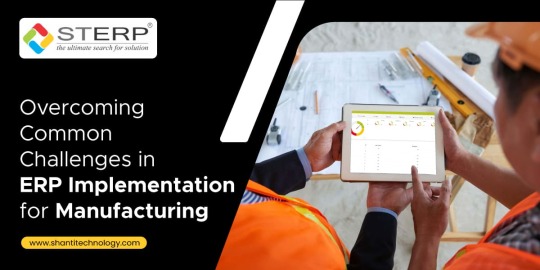
This blog post aims to examine the world of ERP for manufacturing industry, focusing on the most effective ERP solutions suitable for manufacturing enterprises of varying scales, encompassing both large-scale operations and small-scale organisations. Furthermore, we will explore the common challenges that manufacturers face during the adoption of the best ERP software for manufacturing companies and offer practical strategies for overcoming these difficulties.
The Power of ERP for Manufacturing:
Prior to delving into the complexities and remedies associated with the adoption of Enterprise Resource Planning (ERP), it is essential to comprehend the profound impact that ERP systems have on the manufacturing sector.
· ERP for Manufacturing Industry:
The manufacturing industry is characterised by intricate procedures, a wide range of product offerings, and complicated supply chain dynamics. Enterprise Resource Planning (ERP) demonstrates its exceptional capabilities in this context. Enterprise Resource Planning (ERP) systems for manufacturing encompass the integration of several operational tasks, such as production planning, inventory management, quality control, and finance management, under a unified and interconnected platform. The integration described herein provides manufacturers with the capability to access real-time visibility into their operations, hence facilitating data-driven decision-making and improving overall efficiency.
· Best ERP for Manufacturing Industry:
When it comes to the selection of ERP software for the manufacturing industry, it is imperative to carefully evaluate a system that is in line with the unique requirements of the organisation. Prominent enterprise resource planning (ERP) solutions catering to the manufacturing industry encompass SAP S/4HANA, Oracle ERP Cloud, Microsoft Dynamics 365, and STERP by Shanti Technology. These solutions provide comprehensive functionalities specifically designed for manufacturing processes, enabling organisations to enhance production efficiency, minimise expenses, and enhance overall profitability.
· ERP for Small Manufacturing Businesses:
Enterprise Resource Planning (ERP) systems are not exclusively designed for huge organisations but can also be beneficial for small manufacturing businesses. ERP systems can provide significant advantages to small manufacturing enterprises as well. Indeed, the implementation of an appropriate Enterprise Resource Planning (ERP) solution can effectively equalise the competitive landscape for small-scale firms, equipping them with the necessary resources to compete efficiently. Scalable choices, such as Shanti Technology's STERP, present themselves as suitable solutions for small enterprises seeking expansion opportunities.
Challenges in ERP Implementation for Manufacturing:
Although the potential benefits of Enterprise Resource Planning (ERP) are alluring, the process of deploying such systems might be perceived as a formidable endeavour accompanied by several obstacles. Manufacturers frequently encounter several challenges in their operations.
· Resistance to Change:
Resistance to change is a prominent obstacle encountered with the adoption of Enterprise Resource Planning (ERP) systems. There may exist a certain degree of resistance among employees who have become accustomed to utilising legacy systems over an extended period of time, hence exhibiting hesitancy towards embracing novel technological advancements. In order to surmount this problem, it is imperative to engage employees from the inception, effectively communicate the advantages of Enterprise Resource Planning (ERP), and offer thorough training and assistance.
· Data Migration:
The process of data migration is often characterised by its complexity and time-intensive nature. The process of migrating data from outdated legacy systems to a modern Enterprise Resource Planning (ERP) system has the potential to result in errors and compromise the integrity of the transferred data. The rigorous planning, validation of data accuracy, and implementation of a comprehensive data migration strategy are crucial.
· Integration Issues:
The effectiveness of ERP systems relies on their ability to smoothly integrate with other software and systems utilised inside the organisation. The integration process may encounter difficulties when preexisting systems lack compatibility with the newly implemented Enterprise Resource Planning (ERP) system. Conducting a comprehensive compatibility study and making necessary investments in middleware are critical measures to ensure seamless integration.
· Budget Overruns:
Budget overruns are a common occurrence in Enterprise Resource Planning (ERP) implementations, mostly attributed to unanticipated expenditures such as customisation, supplementary training, or prolonged project schedules. In order to address the issue of budget overruns, it is advisable to develop a comprehensive budget plan, including provisions for unforeseen circumstances, and maintain vigilant oversight of expenditures during the execution phase.
Overcoming ERP Implementation Challenges:
· Change Management:
In order to mitigate resistance towards change, it is imperative to involve employees at an early stage of the process. Organise seminars, facilitate training sessions and effectively articulate the advantages of the Enterprise Resource Planning (ERP) system. Promote the solicitation of feedback and implement necessary modifications in accordance with user input. Resistance to the implementation of the best ERP software for manufacturing company tends to decrease when employees perceive the system's usefulness and receive enough support during the transition process.
· Data Migration Strategy:
The effectiveness of data migration is contingent upon thorough planning and precise implementation. Establish a data migration team tasked with the responsibilities of data cleansing, validation, and mapping. It is advisable to conduct testing of data migration procedures inside a controlled setting prior to executing the implementation on a larger scale. It is imperative to consistently perform data backups in order to safeguard data integrity throughout the transfer process.
· Integration Expertise:
In order to address integration difficulties, it is advisable to engage in collaboration with ERP suppliers and IT professionals who possess specialised knowledge and skills in the field of integration. These individuals possess the ability to identify possible challenges related to integration and devise appropriate strategies to address them. It is advisable to explore the option of investing in middleware or connectors that can effectively facilitate the integration process between the Enterprise Resource Planning (ERP) system and the pre-existing systems.
· Budget Management:
In order to mitigate the occurrence of budget overruns, it is advisable to design a budget that is grounded in realism and includes a contingency fund. It is advisable to conduct periodic evaluations of expenditures and make necessary modifications to the budget accordingly. It is advisable to give precedence to fundamental customization and supplementary components while postponing non-essential functionalities to subsequent stages of the implementation process. The implementation of a staged approach can effectively manage expenses while also guaranteeing the establishment of essential functionality.
Leveraging STERP for Manufacturing Company:
In the context of addressing the obstacles encountered during ERP adoption, it is vital to underscore the potential value that Shanti Technology's STERP solution holds for manufacturers.
· STERP's Manufacturing Expertise:
The manufacturing expertise of STERP is highly regarded as it is an ERP solution that has been specifically tailored to meet the needs of the manufacturing industry. The software provides a variety of functionalities specifically designed for manufacturing operations, including but not limited to demand prediction, production scheduling, and quality management. The industry-specific experience of STERP facilitates the deployment process and guarantees a seamless alignment between your ERP system and your manufacturing requirements.
· Scalability for Small Manufacturers:
Scalability is a crucial aspect for small manufacturers, and it has been observed that the Small Manufacturer Enterprise Resource Planning (STERP) system offers a viable solution in this regard. As an enterprise expands, the Scalable Technology and Enterprise Resource Planning (STERP) system may effectively meet the increasing requirements, so serving as a favourable option for organisations seeking efficient scalability without the necessity of investing in a new Enterprise Resource Planning (ERP) system in the future.
· Comprehensive Training and Support:
STERP provides a comprehensive training and support programme aimed at facilitating a seamless changeover process. STERP offers a comprehensive range of services, including on-site training sessions and round-the-clock customer support, to ensure that your staff is adequately equipped to maximise the efficiency and effectiveness of the ERP system.
Final Thoughts:
The deployment of Enterprise Resource Planning (ERP) systems in the manufacturing business presents several difficulties. However, by employing appropriate techniques and utilising the best ERP software for manufacturing companies, developed by STERP (Shanti Technology), these issues can be effectively addressed. Manufacturers can optimise the utilisation of ERP systems by effectively handling resistance to change, methodically preparing data migration, managing integration processes efficiently, and maintaining strict adherence to budgetary considerations.
It is important to acknowledge that the adoption of Enterprise Resource Planning (ERP) systems should not be viewed as a singular occurrence, but rather as a continuous endeavour aimed at achieving optimal performance. It is imperative to consistently evaluate the performance of your Enterprise Resource Planning (ERP) system, solicit input from users, and remain abreast of prevailing industry standards in order to ascertain that your ERP system is capable of efficiently supporting your manufacturing activities.
The STERP system represents an optimal enterprise resource planning (ERP) solution specifically designed for the manufacturing sector. It provides customised functionalities, scalability, and comprehensive assistance to enable firms to excel in a highly competitive market. Manufacturers can achieve operational streamlining, enhanced efficiency, and long-term success in the ever-changing industrial landscape by making informed decisions on the selection of an appropriate Enterprise Resource Planning (ERP) solution according to established implementation best practices.
#ERP for manufacturing industry#Best ERP for manufacturing industry#ERP for small manufacturing business#Best ERP software for manufacturing#Manufacturing software for small business#Best ERP for small manufacturing business#ERP software for manufacturing industry#ERP for manufacturing company
7 notes
·
View notes
Text
SAP CX Commerce Cloud | CX Implementation
Title: SAP CX Commerce Cloud: Elevating Customer Experience with Seamless Implementations
Introduction: In today's competitive digital landscape, delivering exceptional customer experiences has become a critical differentiator for businesses. SAP Customer Experience (CX) solutions, specifically SAP CX Commerce Cloud and SAP Hybris Commerce, are at the forefront of empowering companies to achieve unparalleled customer engagement and loyalty. Let's explore how these solutions enable seamless CX implementations and the comprehensive CX services that drive success.
SAP CX Commerce Cloud: Enhancing E-Commerce Experiences SAP CX Commerce Cloud is a powerful cloud-based platform designed to transform e-commerce experiences. It provides businesses with a flexible and scalable solution to deliver personalized and consistent shopping experiences across various touchpoints. Leveraging cutting-edge technologies, it enables seamless integration, real-time data insights, and exceptional customer journeys.
CX Implementation: A Roadmap to Success A successful CX implementation is pivotal for businesses aiming to provide outstanding customer experiences. SAP Hybris Commerce, now known as SAP CX Commerce, offers robust capabilities to help companies seamlessly implement and customize their e-commerce solutions. Through meticulous planning, streamlined execution, and effective change management, businesses can optimize their CX strategies and stay ahead of the competition.
SAP Hybris Commerce: Powering Omnichannel Experiences Formerly known as SAP Hybris Commerce, SAP CX Commerce Cloud empowers businesses with a unified platform to deliver consistent and personalized customer experiences across various channels, including web, mobile, and social. The platform seamlessly integrates with back-end systems, enabling businesses to efficiently manage their online storefronts and optimize inventory management.
SAP Customer Experience Hybris: Elevating Customer Engagement SAP Hybris Commerce, now part of the SAP Customer Experience suite, is a leading e-commerce solution that allows businesses to elevate customer engagement. By leveraging customer insights, intelligent marketing tools, and robust analytics, businesses can understand customer preferences better, enabling them to deliver tailored offers and personalized experiences.
CX Services: Comprehensive Support for CX Excellence Techwave's SAP CX Services offer businesses comprehensive support to ensure the successful deployment, integration, and ongoing management of SAP CX Commerce Cloud and SAP Customer Experience solutions. From implementation and customization to post-implementation support and optimization, Techwave's team of experts assists businesses in harnessing the full potential of their CX solutions.
SAP Customer Experience: Unifying Customer Touchpoints SAP Customer Experience encompasses an array of solutions, including SAP CX Commerce Cloud, SAP Marketing Cloud, SAP Sales Cloud, SAP Service Cloud, and SAP Customer Data Cloud. This integrated suite empowers businesses to deliver consistent, contextual, and meaningful interactions across the entire customer journey.
SAP Hybris Commerce Cloud: A Future-Ready Solution SAP Hybris Commerce Cloud, now SAP CX Commerce Cloud, is a future-ready platform that ensures businesses can quickly adapt to changing customer needs and market demands. With continuous innovation and upgrades, businesses can stay at the forefront of e-commerce excellence.
Conclusion: Embracing SAP CX Commerce Cloud and SAP Hybris Commerce is not just about keeping up with the trends; it's about revolutionizing how businesses connect with their customers. These solutions, combined with expert CX services, enable businesses to deliver unforgettable customer experiences, drive loyalty, and secure a competitive advantage in the digital era. Partner with Techwave for a seamless CX implementation and unlock the true potential of your e-commerce strategy.
#sap cx commerce cloud#cx implementation#sap hybris commerce#sap customer experience hybris#cx services#sap customer experience#sap hybris commerce cloud#sap commerce services
2 notes
·
View notes